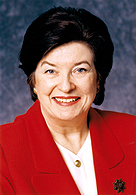 By Margaret Wilson
By Margaret Wilson
I spent two days of a recent visit to England on a "businessman's
holiday." Following a relaxed week in the gardens and fishing ports of Devon, I went
up to the big smoke, London, to visit the Department of Education and Training, the
Teacher Training Agency and our new sister regulatory body, the General Teaching Council
for England.
The General Teaching Council (GTC) is in its startup phase. The election
of the Council had been completed when I was there, but the results were not yet
announced. With well over 400,000 members, it will have a significant impact on policy
development in teaching in England. Despite the difference in size, many of the issues
facing the new Chief Executive Officer, Carol Adams, are identical to those our College
faced recently.
First, how to find the teachers. Next, the transfer of the
qualifications file and the question of its accuracy. Then committees, processes, policies
- all to be developed from scratch. Some of our work will be useful as a base for further
development to suit their needs and I have promised to send samples of our processes to
help jump start some of the work that must be done.
CURIOUS DESIGN
One of the things that strikes me as curious in the design
of the GTC for England is that it does not have the authority to accredit teacher training
institutions. This power still rests with an organization called the Teacher Training
Agency (TTA).
The TTA not only accredits the teacher training institutions but also
funds them. One of the consequences of an "unsuccessful" accreditation round may
be a cut in funding. Another may be, and has been, no funding and closure.
The TTA is also responsible for teacher recruitment in the broad sense.
For the upcoming school year, candidates in one-year post-degree programs in teacher
training institutions may apply for a grant of £13,000.
England has reintroduced an induction period prior to permanent
certification as a teacher. During the induction period, the beginning teacher has a
reduced timetable. The school is given a grant to subsidize the cost of assigning an
experienced teacher to mentor and to provide for ongoing education courses for the
beginning teacher. The head teacher (principal) is responsible for reporting successful
completion of induction. The rate of pay for beginning teachers is not reduced in this
scheme.
PAY RANGES
England has also introduced multiple pay ranges. The first
pay range applies to teachers with seven to nine years experience. They may then apply for
a Threshold Assessment conducted by both the head teacher and an external assessor. A
successful assessment entitles the teacher to a £2,000 pay increase and access to an
upper pay range.
Teachers will be assessed on knowledge and understanding of the teaching
of their subjects, planning of curriculum delivery, attention to the needs of individual
students, use of a variety of teaching methods and management of their classrooms. They
must also demonstrate that their pupils are progressing as a result of their teaching.
Further expectations are that teachers use the outcomes of their own professional
development to improve their teaching and pupils' learning and that they make an active
contribution to the school in general. The stated aim is that most teachers will achieve
the second salary range.
There was much more than this that was interesting in a country in which
the detail of education policy is widely reported and debated on a daily basis and in
which the ferment is even more intense than it is here. I'll return in a future column to
the teacher recruitment issue and teacher morale.

